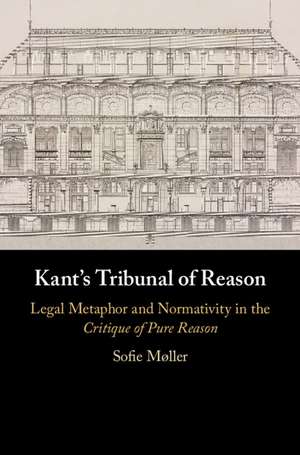Kant's Tribunal of Reason: Legal Metaphor and Normativity in the Critique of Pure Reason
Autor Sofie Mølleren Limba Engleză Hardback – 4 mar 2020
| Toate formatele și edițiile | Preț | Express |
|---|---|---|
| Paperback (1) | 280.91 lei 6-8 săpt. | |
| Cambridge University Press – 22 dec 2021 | 280.91 lei 6-8 săpt. | |
| Hardback (1) | 688.23 lei 3-5 săpt. | |
| Cambridge University Press – 4 mar 2020 | 688.23 lei 3-5 săpt. |
Preț: 688.23 lei
Preț vechi: 773.29 lei
-11% Nou
Puncte Express: 1032
Preț estimativ în valută:
131.70€ • 138.13$ • 109.63£
131.70€ • 138.13$ • 109.63£
Carte disponibilă
Livrare economică 12-26 martie
Preluare comenzi: 021 569.72.76
Specificații
ISBN-13: 9781108498494
ISBN-10: 1108498493
Pagini: 208
Dimensiuni: 158 x 234 x 15 mm
Greutate: 0.36 kg
Editura: Cambridge University Press
Colecția Cambridge University Press
Locul publicării:Cambridge, United Kingdom
ISBN-10: 1108498493
Pagini: 208
Dimensiuni: 158 x 234 x 15 mm
Greutate: 0.36 kg
Editura: Cambridge University Press
Colecția Cambridge University Press
Locul publicării:Cambridge, United Kingdom
Cuprins
Introduction; I.1 The cognitive function of metaphors; I.2 Methodological considerations; I.3 The primacy of practical reason and epistemic normativity; I.4 Outline of the book; 1. The critique as the establishment of reason's lawful condition; 1.1 The critique as a review of laws; 1.2 The natural right tradition and the Naturrecht Feyerabend; 1.3 The critique as a lawful solution to conflicts; 1.4 Establishing a rightful condition; 2. The normativity of law; 2.1 Natural right and positive law; 2.2 Laws of nature in the natural sciences; 2.3 A priori laws as objectively valid rules; 2.4 Laws and principles; 2.5 The understanding as prescribing laws to nature; 3. The transcendental deduction and the tradition of legal deductions; 3.1 Quid juris and the transcendental deduction; 3.2 The analogy between concepts and property; 3.3 The transcendental deduction as a legal deduction tracing an origin; 3.4 The tradition of legal deductions; 4. The question of fact and the question of law in judicial imputation and in the transcendental deduction; 4.1 Quid facti and the tracing of an origin; 4.2 Quid facti and the metaphysical deduction; 4.3 The question of fact and the question of law in judicial imputation; 4.4 The transcendental deduction as judicial imputation; 5. The tribunal of reason; 5.1 The critique as tribunal; 5.2 The Antinomies as a legal trial; 5.3 Empirical experience as testimony; 5.4 The reader as judge of the critique; 5.5 The outcome of the critique as verdict; 6. Moral conscience as the practical inner tribunal; 6.1 Conscience as an inner tribunal; 6.2 Self-deception in moral conscience; 6.3 The problem of an erring conscience; 6.4 Parallels between moral conscience and the critique of pure reason; 7. Distinguishing between rightful claims and groundless pretensions; 7.1 Historical background on judicial authority; 7.2 Kant on judicial authority; 7.3 The judicial office in the legal metaphors; 7.4 Authority and validity of judgments and inferences; 8. Epistemic authority as both individual and collectively shared; 8.1 Decrees as the opposite of verdicts; 8.2 Cognitive attitudes; 8.3 Epistemic authority and the thinking self; 8.4 Political aspects of the critique of pure reason; 8.5 The community of cognisers; 9. Systematicity and philosophy as the legislation of reason; 9.1 Other images of systematicity: the organism and the building; 9.2 The legal metaphors as illustrations of systematicity; 9.3 Philosophy as the legislation of human reason; 9.4 Systematicity in the Appendix to the Transcendental Dialectic; 9.5 The critique as the science of the laws of pure reason; Conclusion.
Recenzii
'The simplest objection to Kant's Critical project – the claim that reason cannot critique itself – is one that Kant himself not only anticipated but largely answered. Moller shows how Kant's extensive legal metaphors throughout the Critique of Pure Reason form a coherent whole intended to explain the basis of reason's self-critique. She provides the best explanation yet of how Kant defended his critical project, one that also reveals Kant's deep understanding of natural law theory.' Frederick Rauscher, Michigan State University
'… offers the reader a detailed and historically rich account of the legal terminology that Kant adopts or references. Møller's book is a wonderful antidote to the sense one sometimes has, even when one reads Kant in the original, that one is still reading a slightly different and distant language.' Kantian Review
'… offers the reader a detailed and historically rich account of the legal terminology that Kant adopts or references. Møller's book is a wonderful antidote to the sense one sometimes has, even when one reads Kant in the original, that one is still reading a slightly different and distant language.' Kantian Review
Notă biografică
Descriere
This is the first book-length study in English of Kant's legal metaphors, whose philosophical importance has so far been overlooked.
